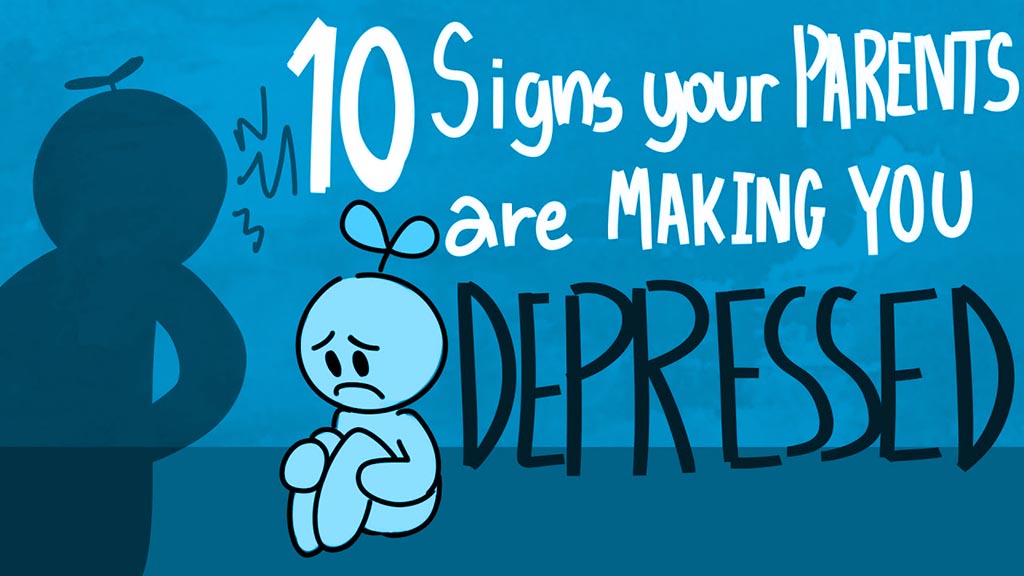Are you miserable or depressed when you’re around your parents?
Battling depression, it’s important you have a strong support system.
And that includes having a supportive family. But it can be difficult when it’s your parents that are causing some of the trauma you’re trying to undo.
Here are 10 Signs that Your Parents Are Making You Depressed.
1) They hold you back from your dreams.
Your parents try to make that decision for you without considering how you feel. Do you feel as if, you have to sacrifice your happiness to please them?
If so, you might end up resenting them.
It’s important you have the freedom to choose your own path and decide what YOU wanna do with your life.
2) They put a lot of pressure on you.
Another way your parents might be making you unhappy is by putting too much pressure on you and making you live up to their unrealistic expectations.
They may say that you’re the only good thing in their life.
So, you feel like you have to stay by their side and put their happiness above yours
3) They’re emotionally unavailable to you.
Do your parents act cold and distant toward you?
You might feel like you can’t connect with them emotionally or find it hard to be vulnerable with them.
This could lead to problems, informing and maintaining meaningful relationships as you grow older.
You may end up feeling disconnected from others in your life.
Which could spiral into depression.
4) Their presence overwhelms you.
Do you feel anxious and overwhelmed when your parents come to visit you?
It’s a sign if you feel tense and uncomfortable and become less focused when they’re around.
There may be something wrong with your relationship with them if you always end up feeling emotionally and mentally exhausted afterward.
5) They worsen your depression.
Do your symptoms get worse when you’re parents are around?
Spending time with them makes you miserable. That’s a sign that they’re toxic for you.
Maybe they’re too harsh and inconsiderate. Whatever the reason, it’s okay to admit that you don’t wanna be around your parents and the negativity they bring along.
Also Read: What Are the Advantages of Hypnobirthing?
6) Their dysfunction rubs off on you.
Like most people, the way you deal with your issues was learned from your parents.
Were you taught good coping methods like talking out your feelings and reaching out for help? Or did your parents show you unhealthy ways to cope?
If so, you may isolate yourself and struggle with controlling your emotions. You may be easily upset and tend to have an emotional breakdown.
All of which are signs of Depression.
7) Their mental illness affects you.
Are your parents suffering from a mental illness?
A number of studies have shown that growing up with a parent who has a mental illness can affect you in a lot of negative ways.
For example, parents with Narcissistic Personality Disorder are often emotionally and mentally abusive to their children.
And those who have parents with depression are more likely to develop an anxiety disorder or depression of their own.
8) They struggle with substance abuse.
Do you have a parent who is a drug addict or an alcoholic?
Those who struggle with substance abuse are often neglectful, unreliable, and emotionally unavailable.
They can’t provide the safety and security you need growing up.
They also have a tendency to turn abusive and cause their children to develop Post-Traumatic Stress Disorder (PTSD). Or even substance abuse problems of their own.
9) They have become abusive.
Domestic violence and parental abuse can have a lot of damaging effects. Whether physical, emotional, or mental abuse, it can leave you traumatized for years to come.
Once they repeatedly and regularly intimidate, threaten, or harass you, they’re putting you and your mental health at risk.
10) They don’t help you overcome your depression.
Even if your parents aren’t the direct cause of your depression they can still be making it worse by not supporting you and your struggle against it. They don’t make an effort to educate themselves or they just refuse to acknowledge your mental illness.
It’s a sign if they discourage from reaching out to guidance counselors or mental health professionals.
Do your parents show any of these signs?












